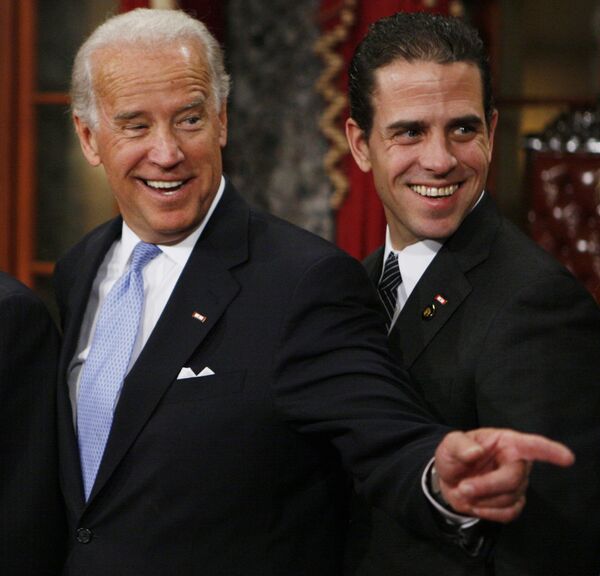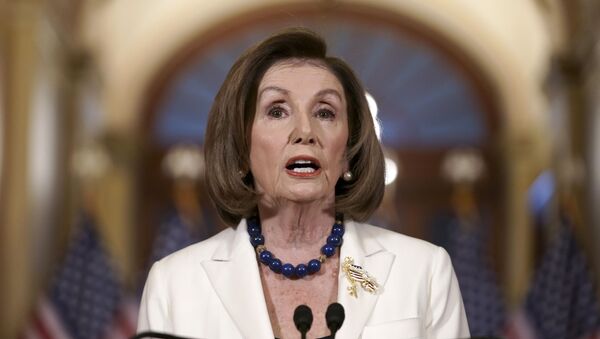On 10 January, House Speaker Nancy Pelosi announced that next week she would transmit two articles of impeachment to the Senate for trial, thus ending a standoff with the Republicans and Senate majority leader Mitch McConnell over her hesitance to send the documents to the upper chamber.
Following the 12 December impeachment vote, the House speaker opted to withhold the articles, citing her doubts that the Senate would conduct a fair trial.
"It’s about a fair trial", Pelosi reiterated in an interview with ABC’s This Week on Sunday, explaining the impeachment delay. "They take an oath to have a fair trial and we think that would be with witnesses and documentation".
There will be no haggling with the House over Senate procedure. We will not cede our authority to try this impeachment. The House Democrats’ turn is over. The Senate has made its decision. This is for the Senate, and the Senate only, to decide.
— Leader McConnell (@senatemajldr) January 8, 2020
Impeachment Trial: Pelosi, McConnell Cross Swords Over Witnesses
According to Sean D. Foreman, a professor of political science at Florida-based Barry University, the initial delay seemed justified because the vote to approve the articles of impeachment happened just days before the holiday recess.
"But, in the meantime, Democrats started to demand that the Senate Republicans provide the rules for the trial before they would deliver the articles," the professor says. "This is where Speaker Pelosi began to lose the argument and the confidence of many of her supporters about her resolve on this matter. There must be another reason for the delay that has not been revealed yet, or else this was a serious miscalculation by Pelosi."
Speaking to ABC’s This Week on Sunday, the House speaker argued that the delay was largely aimed at forcing the Senate to call witnesses during the trial. However, McConnell signalled that he would not call any witnesses until after he hears the opening statements from the House managers who are prosecuting the US president and Trump's legal team.
"The Republicans have the majority of votes in the Senate and as long as they stay tightly united then they can agree to conduct the impeachment trial according to their will," he stresses. "It would certainly make sense to call witnesses if they really wanted to get to the bottom of what happened in this case. But Republicans are not interested in getting to the bottom of the case, they want to get to the end of the trial so that they can put this behind them and focus on other issues including the upcoming elections."
Foreman elaborates that once the Senate gets the aforementioned articles of impeachment it will "move swiftly with the trial", adding that it is still unclear "whether a shorter or longer trial will work to the benefit of the president in the eyes of American voters".
The political scientist opines that at the same time "the impeachment trial has the potential to be a wild card in the race", as "Democrats gear up to start voting on who will be their presidential nominee".
"Several candidates are senators who will be jurors in the trial and former Vice President [Joseph] Biden is implicated at the centre of the impeachment charges against Trump," Foreman points out, referring to the controversy surrounding Biden's son, Hunter, and his role at Ukrainian energy company Burisma during his father's vice presidency.

American corporate lawyer Ron Coleman, for his part, says that "it was obvious to all observers that the postponements were caused by political machinations".
"The House Democrats were hoping to use media and political pressure to get the Senate Republicans to make any of a number of potential concessions regarding procedural matters for the Senate trial. The Republicans did not blink. It also turned out that the Democrats were preparing 'additional evidence' – the Parnas testimony - that they obviously planned to reveal during the Senate trial. They lost so much momentum waiting for the Republicans to offer something they had no reason to offer, however, that they used that 'surprise' to pump some more air into their very deflated impeachment balloon".
Why the House is Seeking to Limit Trump's War Powers
In parallel, the House Democrats have come up with yet another initiative targeting Donald Trump: following the extraterritorial targeted assassination of Iranian Quds Force Commander Qasem Soleimani, Pelosi announced that the House would seek to limit Trump's "war powers" over his administration's "provocative and disproportionate military airstrike".
On 9 January, the House passed a resolution aimed at obliging Donald Trump to seek the US Congress' approval before pursuing military action against Iran, even though the US president announced his willingness to de-escalate in the wake of Tehran's 7 January retaliatory missile strike on Iraqi military bases housing American troops.
"It is important to understand that just because the House of Representatives passes a bill, that doesn't mean the bill will become law or will be binding on the president," explains Daniel P. Franklin, associate professor of political science at Georgia State University. "This Resolution was passed pursuant to the War Powers Resolution (WPR), which has yet to be tested in the courts."
Franklin stresses that it remains unclear whether "a similar resolution will get through the Senate or even be brought to the floor of the Senate for a vote".
"Therefore, this bill is more in the nature of a signal to the Trump administration that the House of Representatives, at least, will not be willing to support and possibly even fund future conflicts in the Middle East without being consulted in advance", the professor elaborates, highlighting that Trump didn't even inform congressional leaders in advance of what was going to happen.
According to him, the War Powers Resolution can be used "as a tool by the president to build support, share responsibility and get a second opinion on what is probably the most important decision a president can make".
"In the age of air power and nuclear weapons, it may be necessary for presidents to act on their own authority," Franklin says. "There may not be sufficient time for the president to consult. However, those types of situations are extremely rare. Thus, the decision to use force is probably much too often left to the president's own authority, even in the modern era. And as we have seen with increasing frequency, that is a prescription for disaster".




